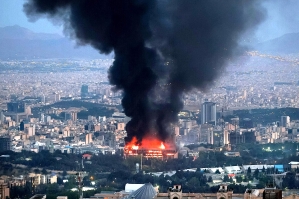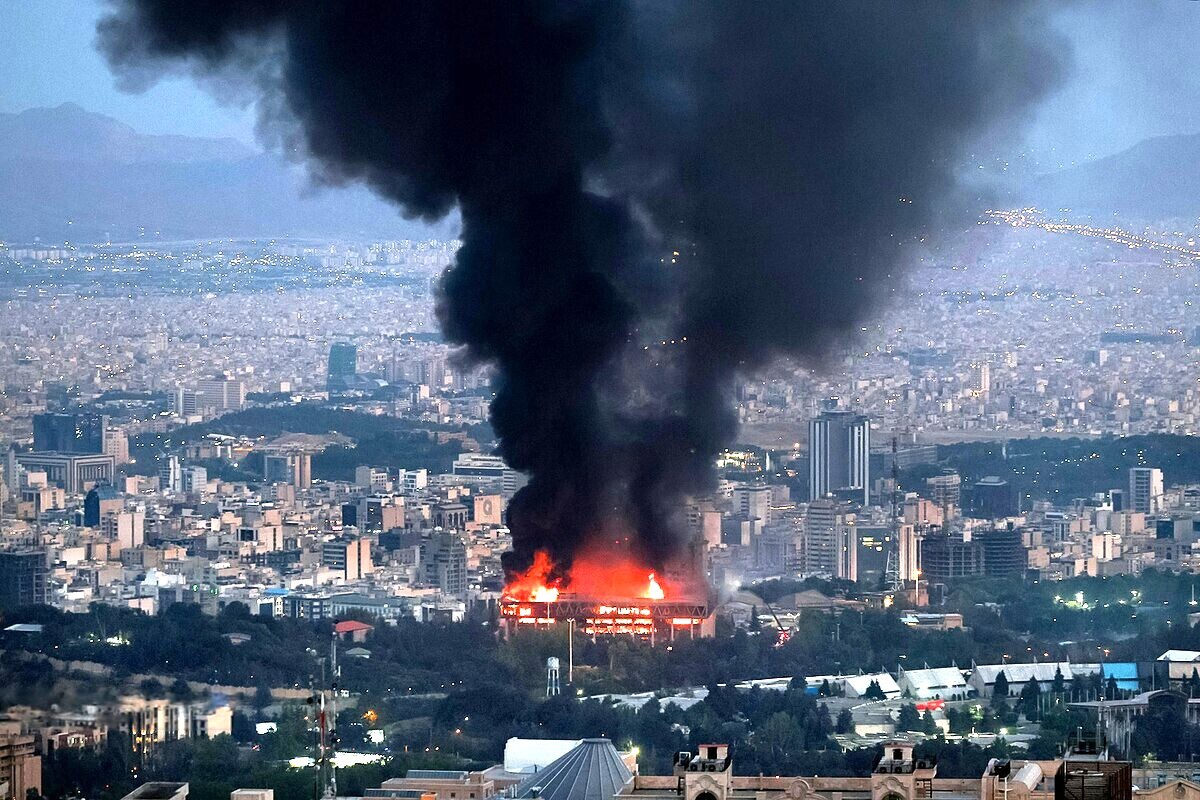 Islamic Republic of Iran Broadcasting studio after Israeli bombing on June 16, 2025. Avash Media, Creative Commons
Islamic Republic of Iran Broadcasting studio after Israeli bombing on June 16, 2025. Avash Media, Creative Commons
At least 21 Christians have been arrested in five different cities in Iran in a crackdown on “dissent” following the end of military conflict with Israel, according to advocacy group Article18.
In the two weeks following the end of Iran-Israel bombings on June 24, Iran’s Ministry of Intelligence arrested the Christians in Tehran, Rasht, Orumiyeh, Kermanshah and Varamin, and other detentions ostensibly related to the post-conflict crackdown were continuing, according to Article 18. In addition, a Christian was arrested in Kerman just before the Israeli bombings began on June 13.
Since a ceasefire went into effect on June 25, authorities in Iran have targeted hundreds of ethnic and religious minorities on the pretext of being “collaborators” or “spies” for Israel or the United States, according to a group of U.N. experts, including Special Rapporteur on Freedom of Religion or Belief Nazila Ghanea.
“Post-conflict situations must not be used as an opportunity to suppress dissent and increase repression,” they wrote in a recent statement.
Some of the detained Christians were threatened with arrest for alleged collaboration with “hostile states” such as Israel or the United States under a newly proposed law seeking to enforce harsher punishments, Article 18 stated. While arrests came during the crackdown on alleged dissenters, some were based on charges long levelled at Christians, such as possession of Bibles, the group stated.
“In Iran, prosecutors and judges frequently label evangelical Christians as ‘Zionists,’ ‘deviant’ and belonging to ‘illegal sects’ in an attempt to distinguish between them and the tolerated Orthodox and Catholic Christians of Armenian and Assyrian descent,” Article 18 noted.
The U.N. experts’ statement warned against Iran’s “dehumanizing rhetoric” against minorities, saying they had received “reports of incitement to discrimination, hostility and violence in the media, which have labelled entire minority communities as traitors and used dehumanizing language such as ‘filthy rats,’” they stated.
During the Israel bombings Tehran’s notorious Evin Prison was struck and prisoners transferred elsewhere, and the U.N. experts decried that “the fate and whereabouts of some prisoners remain unknown, placing them outside the protection of the law – a situation that amounts to enforced disappearances.”
“At least 11 Christians were in Evin at the time of the strike on the prison, and all are believed to have been transferred to different facilities in the Tehran region, though not all have been accounted for,” the U.N. experts stated.
A Christian convert among more than 60 female political prisoners transferred to Qarchak Prison, Aida Najaflou, 43, was arrested in February. She was one of five Christians recently charged with “gathering and collusion” and “propaganda against the Islamic Republic of Iran” in an indictment related to ordinary Christian acts such as praying and performing baptisms, according to Article 18.
Najaflou faces additional charges of “propaganda activity against the Islamic Republic of Iran in the cyberspace” and “propaganda in favor of groups or organizations opposed to the Islamic Republic of Iran,” due to allegedly posting on social media in support of the “Women, Life, Freedom” protests and against former Hezbollah leader Hassan Nasrallah, according to Article 18.
The U.N. experts’ statement included concern over reports of executions, enforced disappearances and mass arrests, including three Kurdish men and three others reportedly executed on charges of “espionage for Israel.”
“Hundreds of individuals, including social media users, journalists, human rights defenders, foreign nationals – particularly Afghans – and members of ethnic and religious minorities such as Baha’is, Kurds, Balouchis and Ahwazi Arabs have been detained on accusations of ‘collaboration’ or ‘espionage,’” they stated. “The conflict has also substantially exacerbated Afghan deportations from Iran, with 256,000 returned in June alone amid serious refoulement concerns.”
The experts expressed alarm at official statements announcing expedited trials on accusations of espionage, putting individuals at heightened risk of summary execution or punishment without adequate due process.
The experts warned that Iran’s Parliament is advancing legislation that would classify intelligence or espionage activities carried out for “hostile governments” as “corruption on earth,” an offense punishable by death.
“Criminalising the sharing of information in broad language violates the rights to freedom of expression and information,” the experts said. “This legislation also represents a worrying expansion of the death penalty that violates international human rights law.”
The experts urged the international community to support to Iranian civil society actors, including technical and financial assistance to independent media outlets and human rights groups.
